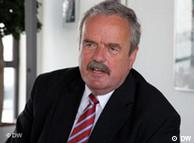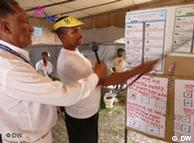Press Freedom | 28.05.2010
Jamming of DW is part of Ethiopia's campaign against press freedom
"These methods are a violation of international law and -- what is even more important -- they are a violation of human rights, particularly the right to freedom of information for people all over the world," Deutsche Welle's director general Erik Betterman said following the news of the intentional disruption of Deutsche Welle broadcasting during the election by the Ethiopian government.
Just as in 2007 and 2008, Deutsche Welle's Amharic radio broadcasts were subjected to jamming, i.e. the deliberate interference of Deutsche Welle's short wave signal.
Two and three years ago it was the invasion of Ethiopian soldiers into Somalia and increasing border tensions with Eritrea that led the government in Addis Abeba to disrupt transmission of Deutsche Welle.
 Bildunterschrift: Großansicht des Bildes mit der Bildunterschrift: DW Director General Erik Bettermann protested against the jamming efforts Bettermann has called the renewed interference of DW's frequencies a drastic attack against "
Bildunterschrift: Großansicht des Bildes mit der Bildunterschrift: DW Director General Erik Bettermann protested against the jamming efforts Bettermann has called the renewed interference of DW's frequencies a drastic attack against "
Jamming linked to elections
According to Ambroise Pierre, director for Africa at Reporters without Borders in
"The jamming of Deutsche Welle in
On the world stage Prime Minister Meles, a Marxist and former guerilla fighter who has led the country for 19 years, presents himself as
Freedom of press not respected
In May after the jamming of the Amharic broadcasts of Voice of America became public, Reporters without Borders sent an open letter to Meles, urging him to uphold the freedom of the press during the election. That demand was ignored, said
"With our letter we wanted to appeal to the prime minister to not interfere with the work of the media. But he obviously didn't heed our demand, since Deutsche Welle is being jammed now as well."
 Bildunterschrift: Großansicht des Bildes mit der Bildunterschrift: The Amharic department at Deutsche Welle in Bonn, GermanySince the election of 2005 which was marred by 200 deaths and charges of massive fraud, the Ethiopian government has been engaged in an aggressive lobbying campaign against the Amharic service of Deutsche Welle. These efforts culminated in a complaint to the German parliament alleging that DW's reporting was biased. While this accusation could be invalidated after broadcast manuscripts were re-translated into German, the jamming was only stopped after the intervention of Chancellor Angela Merkel in Addis Abbeba in 2008.
Bildunterschrift: Großansicht des Bildes mit der Bildunterschrift: The Amharic department at Deutsche Welle in Bonn, GermanySince the election of 2005 which was marred by 200 deaths and charges of massive fraud, the Ethiopian government has been engaged in an aggressive lobbying campaign against the Amharic service of Deutsche Welle. These efforts culminated in a complaint to the German parliament alleging that DW's reporting was biased. While this accusation could be invalidated after broadcast manuscripts were re-translated into German, the jamming was only stopped after the intervention of Chancellor Angela Merkel in Addis Abbeba in 2008.
According to Bettermann the continued attacks by the Ethiopian government and the blocking of unpopular Internet sites through the aid of Chinese software and hardware is a confirmation that
"Since this isn't the first time that we are being jammed, this shows that what we transmit to
Ethiopian authorities could not officially be reached for comment. However, confronted with the alleged jamming, Prime Minister Meles denied any interference with DW's signal in a conversation with the head of the EU's election observer mission (EU-EOM) in
Listeners from all over the world have protested against the jamming during the election weekend. In
Author: Ludger Schadomsky (mik)
Editor: Kristin Zeier
